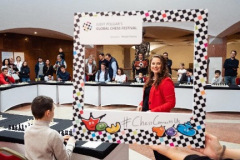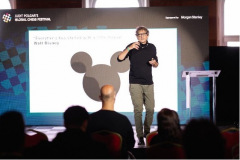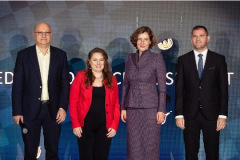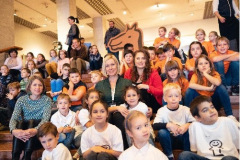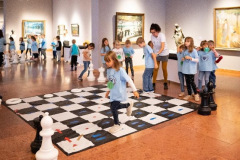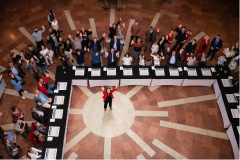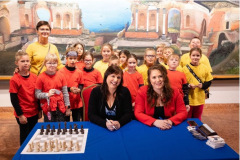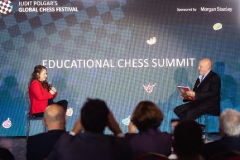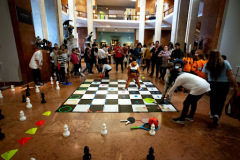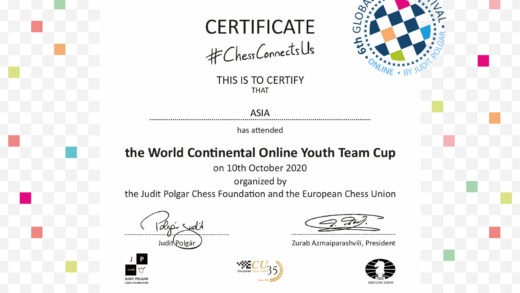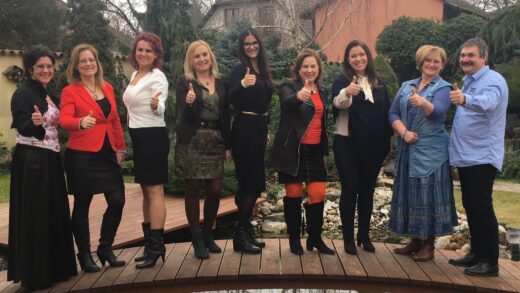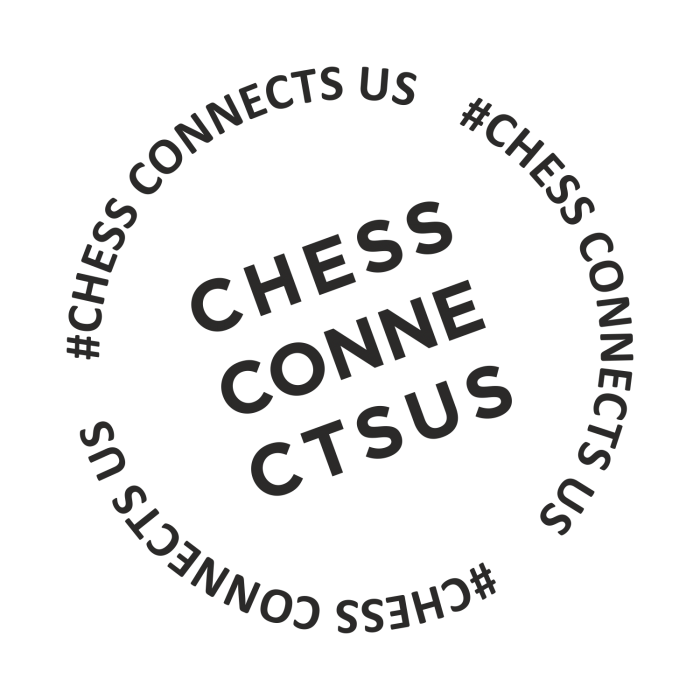This year’s hybrid – on- and offline – Global Chess Festival has been a roaring success, with over 3000 visitors attending the event.
Held on the 9th of October, the chess universe created in the Hungarian National Gallery has been home to many interactive programs, a series of lectures about creativity and innovation and – last but not least – the Educational Chess Summit. The summit welcomed professionally acclaimed lecturers from all around the globe, exploring the power of chess in schools, which examples how educational chess can improve the pupils’ different skills, logical and critical thinking, self-esteem, and gave international recognition to the Judit Polgar Method.
On the 9th of October, the Hungarian National Gallery went through a great transformation: it became a chess palace, home to the Judit Polgar’s Global Chess Festival of 2021, bringing exciting lectures and activities for everyone who wanted to discover the diversity of chess: its connection to education, arts and science. Many countries joined the global celebration of the game: among others Nepal, Uruguay, Israel and Mexico, joined with their own local festivals, amplifying the event’s cross-cultural voice. Those interested were able to follow the event from the comfort of their home as well: apart from the 3.000 visitors in the Hungarian National Gallery, more than 45.000 viewers joined online from all around the world.
Throughout the day, creativity and innovation took the main role: Judit Polgar talks with the legendary Ernö Rubik, the inventor of the world-famous Rubik’s Cube, about his views and thoughts on creativity and innovation. Judit Polgar also shared her thoughts on the role creativity had played in her childhood and career. And how she implements creativity in her daily life and her various projects.
Noam Manella from Israel, the author of the highly
successful books “Think Like a Machine” and the Creative Code, told us
how to awaken the dormant creativity inside ourselves. Indian engineer Ashwin Subramanian
guided us through the details of a revolutionary experiment: using
biofeedback tools to explore what signals chess players’ bodies are
sending while playing and how they can utilize these little cues in
preparation. Norbert Fogarasi, the Head of Morgan
Stanley’s Budapest Office, spoke about the connection between chess,
innovation and business. And there was an unforgettable musical
experience provided by Juga Di Prima. The Chilean
singer-songwriter performed songs that had been composed in the spirit
of gender equality and payed tribute to the best women chess players of
history.
Presenters of the Educational Chess Summit have also showcased the latest results of their work regarding the effectiveness of chess in individual skill-development. According to Ernő Rubik, gamifying education is the way to effectively engage and develop children. Jerry Nash, National Chess Education Consultant
also stated that gamification does indeed have positive effects,
highlighting that – according to his experience – children playing chess
possess a certain “can do attitude” towards any challenge that comes their way. In his speech he claimed that “chess does not only change classrooms, but the whole culture of entire institutions.” He stands by the positive effect chess has on children’s attitude towards learning.
Patronate of the event, Mariya Gabriel, Commissioner for Innovation, Research, Culture, Education and Youth for the European Commission welcomed the visitors in a video message, where she praised the Judit Polgar Method. “I certainly hope that Erasmus+ teacher academies will engage with your Chess Palace approach.” Furthermore, the International Chess Federation, the European Chess Union and the Ministry of Human Capacities also endorses the exemplary nature of the Judit Polgar Method, by publishing a statement in order to popularize Judit Polgar’s chess-based educational programmes throughout the world.
In addition to thought-provoking presentations on the importance of
chess in education, especially in STEM, many exciting games of chess
were played the day leading up to and during the festival. Among them
were the finals of the inter-office tournament of Morgan Stanley – which
attracted more than 400+ entrants from across the investment bank’s global offices. During the festival, visitors were also invited to stop by the Morgan Stanley Chess Café, where they could challenge the firm’s chess masters for a game. Over the last few years simuls have become a tradition of the festival. This year challengers could play in a simultaneous exhibition with Judit Polgar and grandmaster Zoltan Almasi.
Also the ONLINE part of the Global Chess Festival was rich in programs. There were two online Channels:
On Channel 1 the viewers could watch the live broadcast of the stage programs, while the Interactive Chess Channel streamed chess masterclasses with coaches such as Surya Ganguly, Anna Muzychuk, Andras Toth, Noam Manella, Arthur Kogan, Gabor Papp, Krisztian Szabo and Judit Polgar, as well as quizzes and tournaments during the whole day. The Chess Palace Cup was organized for Hungarian kids while the Chess Ambassadors for Environment
blitz tournament invited children from all over Europe and included
social activities as well: a masterclass with Judit Polgar and a lecture
and Q&A session about the Environment & the Climate Change.
This latter program was supported by the European Chess Union.
There were plenty of Global Chess Festival related events even in the period before 11th October: the Play Judit Contest, Kahoot Games, the #ChessConnectsUs Game, the Chess Artistry Competition in memory of Pal Benko and a Quiz.

